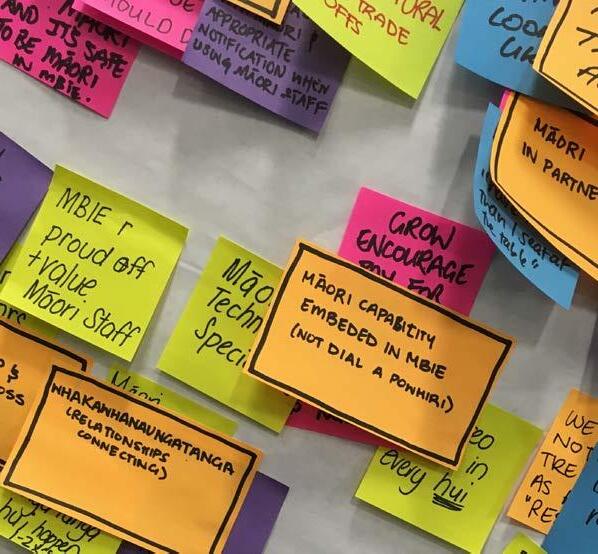
5 minute read
People’s diverse experience drives change
To influence its senior leaders on diversity, equity and inclusion (DEI) initiatives, the People and Culture (P&C) team at Hīkina Whakatutuki Ministry of Business, Innovation and Employment (MBIE) sought first to understand and hear from its people.
MBIE is the government’s lead business-facing agency, with over 6,000 employees, dedicated to shaping and delivering a strong economy for Aotearoa New Zealand. Its purpose, “to grow Aotearoa New Zealand for all”, is best supported by an organisation that reflects the diversity of the communities it serves.
The P&C team recognised it was imperative to understand the experiences of the diverse communities it serves, before designing initiatives to improve those experiences. So it took a systematic approach to enabling its people to share their stories.
“We realised that whilst we celebrate our diversity of work and people, MBIE has a way to go towards genuine equity and inclusion,” says Head of Inclusion and Belonging, Sripriya Somasekhar.
In 2018, the P&C team first mapped the employee experience, to understand what was working well and what the barriers were for its people. It then undertook a survey to better understand people’s perceptions of inclusion and diversity, and this reinforced that experiences were different for diverse communities.
“As we further reviewed data relating to promotion, gender and ethnic pay gaps and performance ratings, it was evident we needed to engage directly with our diverse communities. This was the inception of our People Experience (Px) mahi.”
Across five distinct projects, the mahi affected more than 40 per cent of the workforce. It explored the experiences of tangata whenua, Pasifika, Asian, Rainbow, and employees who identify as being neurodivergent and/or having medical, physical or mental illnesses, disabilities, impairments, conditions, or disorders, or those who are caregivers and support people.
Project teams of eight to 14 people from across the organisation, with a range of ages, tenures, tiers and roles, all with lived experience within the community of focus, were formed.
“We mapped the employee journey through their experiences and then engaged across MBIE with those who wished to share their stories. We did this in culturally appropriate and accessible ways to ensure comfort and safety so our people could share their truths,” Sripriya says.
Kaimahi (workers) who identified as part of the community were invited to share their experiences through workshops, drop-in sessions, a survey and one-on-one interviews. This allowed people to engage in a way that felt safe for them and fit their schedule.
Topics covered in Px kōrero included stereotypes, discrimination and racism, experiences of the work environment and systems, and mental health.
Exploring these employees’ perspectives, cultural values, histories and individual experiences resulted in greater awareness of the discrimination and inequity many people face, from the environment, systems, processes and other people. Also, it helped the wider organisation gain an understanding of the experiences of its diverse communities, improving inclusion and collaboration.
“Hearing from our people, we could understand diverse perspectives. Providing a platform for the kōrero meant the collective voice could be heard. This mahi is about influencing change through listening and understanding,” says Steph Weller, who led the Px mahi.
After each Px engagement, the respective project team presented a report to the Senior Leadership Team (SLT). Each report covers the methodology used, key insights and themes, and recommendations.
“The presentation to SLT was an opportunity for our communities to share their truth and join MBIE to bring the recommendations to life and create a more inclusive and equitable workplace,” says Steph. “By earning the trust of our diverse workforce and representing them accurately to SLT, and wider MBIE, we were able to influence the organisation to bring about change,” she says.
The Px mahi has benefitted MBIE’s workplace culture from an individual to systemic level. The work triggered full systems reviews, including performance conversations, career and pay progression, induction training for new people, position description updates, a recruitment process review and changes to individual employment agreements.
“It is a powerful way to engage and work with people, hearing directly from them, overlaying data, and sharing this throughout the organisation has connected people and senior leaders that would not otherwise be there, it is our people that are influencing the change from the bottom up.”
MBIE was recognised by judges of the 2023 Diversity Awards NZ™ and named the Medium Large Organisation Winner in the Inclusive Workplace category. As the judges say, “MBIE has created an inclusive workplace for their people. The wide collaborative approach has created significant changes in the HR systems and practices.”
MBIE has also recently been awarded the Simpson Grierson Impact Award (Program, Policy, Practice) at the 2023 New Zealand Rainbow Excellence Awards for their Rainbow Employee Experience project.
“We’re shaping processes not just for MBIE but for all of Aotearoa,” says Sripriya. “Since our Px mahi we have seen a significant shift in who sits around the table to make these decisions and who’s involved in shaping policies, processes and systems and also whose voice is being heard.”
Tips from the P&C team on gaining influence from within
People want to be valued, respected and make a contribution through their mahi.
Partner with employees from diverse communities and engage with them in a human-centred, mana-enhancing way.
People need safe spaces and channels where they can share their experience and stories in the workplace.
Ensure their voices are listened to and heard and that workplace practices adapt and change to meet their needs.
Empower project teams to share their insights and recommendations with the senior management team. It shouldn’t just come from HR practitioners.
Publish successes! Let people know what has resulted from their insights and what benefits it has brought to the whole organisation.
Thanks to Diversity Works New Zealand for the repurposing of its full










